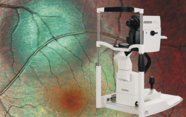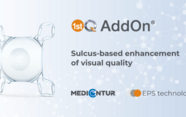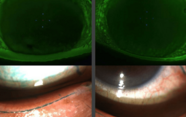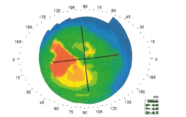NK: Unmasking the Hidden Threat
Routinely classified as a rare eye disorder, neurotrophic keratitis deserves more attention from eye care professionals
Alice T. Epitropoulos, Darrell White | | 4 min read | Opinion

Alice T. Epitropoulos (Credit: Christina Kryszan)

Darrell White
Neurotrophic keratitis (NK) is a debilitating eye condition that has remained in the shadows of eye care practitioners’ conversations for far too long. As we delve into the complexities surrounding this disease, we can see not only that it is overlooked in routine eye examinations, but also that there is a distinct lack of awareness about the potentially vision-threatening condition – even among ocular surface disease experts. Although NK is considered a rare disease, we believe it is more prevalent than previously thought. As advocates for patient care, we feel it is imperative to shed light on the importance of screening for NK, particularly when patients present with signs of dry eye disease (DED) that seem disproportionate to their reported symptoms.
Though DED is routinely addressed during eye examinations, allowing patients of all ages to begin treatment at an early stage, NK – a condition characterized by impaired corneal sensitivity and healing – can masquerade as an exacerbation of DED, especially in patients with chronic disease. This deceptive nature necessitates a more vigilant approach to screening for NK.
A shift in our focus is necessary. Heightened awareness, coupled with a proactive screening approach, can help unveil NK in its early stages and allow for timely intervention. Thankfully, screening for this underdiagnosed entity is simple, straightforward, and accessible in every eye clinic: simply check for corneal sensitivity. Although sophisticated research equipment can give objective measures of sensitivity, we only need to see that corneal sensitivity is obviously reduced. Dental floss (unflavored), a cotton-tipped applicator, or the twisted end of a tissue are all effective tools to test for reduced sensitivity.
With the availability of such a simple diagnostic test, ECPs should broaden their list of possible diagnoses to explain a finding in which the objective signs are out of proportion to a patient’s symptoms. Common things are common, and we live our clinical lives herding proverbial horses. Testing for corneal sensation is the equivalent of turning a spotlight on the herd and instantly identifying the elusive zebra.
At the heart of the matter lies a debate on the rarity of NK. Though some medical experts classify it as a rare disease because of its low incidence in the general population (1), we feel that it is most likely under-diagnosed. This potential underestimation of NK’s true prevalence may lead to progression of the disease, with greater severity present at the time of diagnosis. The historical lack of a standardized definition, as well as variable diagnostic criteria, have also added fuel to this controversy – another likely cause of treatment delay.
Amplifying these challenges is the limited number of effective treatment options. Oxervate, the only FDA-approved medication for NK, stands as a solitary beacon of hope for these patients. In phase III FDA trials, and subsequently in clinics worldwide, it has proven to be effective in treating this potentially vision-threatening disease. Oxervate is marketed and priced as a so-called “rare disease” treatment, a category that can make access to the drug especially challenging in the US.
The financial challenges that patients face when they need newer medications is certainly not unique to eye care; high – sometimes exorbitant – copays can make these types of treatment unaffordable, and many patients face the additional specter of high-deductible health plans (HDHPs), which can make initiating treatment financially daunting. This cuts particularly deeply when an underdiagnosed entity such as NK is involved; after a prolonged process just to ensure a diagnosis, patients are then thrown into the cauldron of the healthcare insurance system.
Though solving the financial issues that plague our healthcare system is certainly beyond the scope of this article, we would like to encourage all stakeholders to spend a moment looking through the eyes of our NK patients. Pharmaceutical companies, governmental regulatory bodies, and healthcare insurers should collaborate to guarantee that patients are not penalized for the rarity of their condition. Efforts should be made to ensure that essential medications are readily available and affordable, especially when only one “lifeline” exists.
It is time to unmask this hidden threat and provide the attention and resources that our NK patients deserve. In doing so, we will help develop our healthcare system into one that truly values the well-being of all – regardless of the rarity of their conditions.
- M Roth et al., “Incidence, prevalence, and outcome of moderate to severe neurotrophic keratopathy in a German tertiary referral center from 2013 to 2017,” Graefes Arch Clin Exp Ophthalmol, 260, 6 (2022). PMID: 34989864.
Alice T Epitropoulos MD specializes in refractive cataract surgery and has a dry eye center of excellence. She is a founding member and proud to be a part of The Eye Center of Columbus, an innovative affiliation of more than 100 ophthalmologists located in Downtown Columbus Ohio. Dr. Epitropoulos also serves as a clinical assistant professor in the Department of Ophthalmology at The Ohio State University.
Dr. Darrell E. White is a cataract and refractive surgeon practicing near Cleveland, Ohio. Dr. White has had an interest in Dry Eye and Ocular Surface Disease since the late '90's. He is a prolific writer and commentator on the space.













